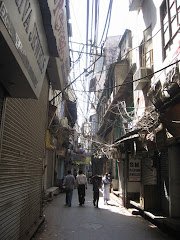Even if we don’t accept the strong religious feelings across the communities against legalizing homosexuality or recognize the scientific evidence of mental and physical aberrations in homosexual practices, it is evident that promoting these behaviors may aggravate problems like HIV AIDS, anal cancer and anxiety disorders, justifying the adage, “personal freedom ends when public peril begins”." Where do I even start on how epically distorted this is? Yes, I'd be willing to accept there might be higher rates of alcohol and substance abuse amongst LGBT populations, but does Mr. Kanth think about why that is? It is in response to the feelings of utter isolation and depression felt by members of the LGBT community, because "India's highly applauded family set-up" (this calls for a whole other post. Do not get me started on how this inherently patriarchal set-up is actually harmful to Indian society) does not accept them, and forcibly brushes their issues under the carpet. Decriminalizing consensual sex between adults will not exacerbate these problems. In fact, acceptance, at some level, at least from the legal code, might help reduce the instances of anxiety disorders, high risk sexual behavior, substance abuse etc. when at least the LGBT community does not feel like criminals in addition to feeling like outcasts. I accept, just as any rational person would, that until we have a reasonable alternative to the provisions of Section 377 of IPC, it cannot be delete. However, that does not in anyway justify Mr. Kanth's seriously flawed arguments in opposition of the reading down of that Section. His arguments seem to be based much less on fact, and much more so on his close-mindedness and bigotry. The entire article reads like one written by a man with a political agenda; whether that agenda is one of discrimination, or seeking funds, or winning friends, I don't know. Besides, why is Prayas or the DCPRC even wasting their time with this? Why are they wasting precious effort and energy opposing something on the shakiest of grounds? I know Prayas recognizes just as well as other child rights groups do, that there is a pressing need for much more comprehensive protections from sexual assault of children: sexual assault is not just through penetration: what about attempted penetration? Forced oral sex? Molestation? (Talking about male children here, I believe these provisions do exist for female children). If I'm not mistaken, there are also no provisions to account for sexual assault on boys by multiple people at a time. Why is DCPRC not concentrating more on fixing these? This is seriously appalling. And someone needs to set these people right now. |
Monday, July 27, 2009
Lies. All of them.
Saturday, July 18, 2009
Equal Rights are not a Zero-Sum Game, Part 2
This new post is in response to this article in TOI.
I would appreciate if you could give suggestions on how to make this stronger.
Dear Mr. Kanth,
This is in response to the article “Child rights panel opposes any dilution of Section 377” published in Times of India (TOI), dated July 17 2009. TOI reports that Delhi Commission for Protection of Child Rights (DCPCR) is strongly opposed to “dilution” of the provision of Section 377 of the Indian Penal Code.
I am student of International Politics and International Development at Georgetown University in Washington, DC and I am passionate about both child rights as well as LGBT Rights. I am presently interning with a child rights organization based in Delhi, and I absolutely understand how crucial the current provisions of Section 377 of IPC are in protecting children from sexual abuse, particularly in the absence of any other adequate provisions in our legal code. I recognize its deletion at this moment, without the necessary amendments to other relevant sections of the IPC would be disastrous. I also recognize that Section 377 has been used almost exclusively to cover sexual offences in India, and instances of actual criminal prosecution of homosexual couples have been negligible.
However, you are quoted as saying “The definition of consensual and non-consensual sex may get blurred in some cases… [some] adolescents [over 18]…[may] not have the adequate decision-making ability.” This statement demonstrates a double standard on your part – while I am willing to accept that certain adolescents may not possess “adequate decision-making abilities”, that would be as true of adolescents engaging in heterosexual activities as those engaging in homosexual activities. It appears hypocritical that the DCPCR is not asking for similar protections for female adolescents.
Additionally, as mentioned in the Delhi High Court verdict, while the provision of Section 377 criminalizing same-sex carnal relations between consenting adults may not have led to any recent prosecutions, it has been used against them in other ways. As stated in the verdict, affidavits, FIRs, judgments and orders have been placed on record that objectively document instances of “exploitation, violence, rape and torture suffered by LGBT persons.” I do not have concrete data to offer on this, but from experience, also know that LGBT youth are more likely to feel suicidal and depressed in a country where the law is against them. Thus, these aforementioned provisions of Section 377 clearly violate basic civic and fundamental rights of LGBT citizens of the country.
As someone working for human rights, you must realize that granting rights to a certain segment of society does not necessarily infringe upon the rights of others in the society. Equal rights do not work as a zero sum game. I am absolutely in agreement with you that the rights of children, and their mental, emotional, and physical health, need to be protected. However, granting LGBT people the right to their private consensual sexual lives need not undermine the rights of children in any way. If there are loopholes to be addressed, such as matters of dubious consent or maturity in age for an adolescent not being in sync with maturity of thoughts and decision-making, DCPCR should focus on closing them, rather than reverting to a blanket ban on sexual relations with consenting homosexual adults. I am certain there must be a better way to address them than holding double standards for heterosexual and homosexual relations.
Monday, July 6, 2009
Equal Rights are not a Zero-Sum Game
Equal Rights are not a Zero-Sum Game
It is painful to note well-educated, prolific and intelligent people propagate misleading and ignorant beliefs. That is the first feeling I had when I read Mr. Swapan Dasgupta’s article “Aggressive Gay Evangelism.” In his article, published in Pioneer dated July 5, 2009, Mr. Dasgupta claims that the Delhi High Court judgment amending Section 377 of the Indian Penal Code may “open the floodgates” to his eponymous term “aggressive gay evangelism.”
He fears that the decriminalization of same-sex carnal relations will eventually, and invariably, lead to such frightening things as lowering the age of consent, accommodating gay marriage, and allowing the right of adoption to gay couples – all ideas that, presumably, go against the “natural order of society.” Why should these ideas be such frightening prospects to Mr. Dasgupta. It is not as if sexual and gender minorities fighting for further rights would personally be harmful to him in any way.
Mr. Dasgupta is concerned about “in-your-face-gayness” and militant gay activism, and believes all gay activism to be defined by this “perverseness.” This concern can be addressed with two brief points. The first is that some amount of what he terms “in-your-face-gayness” is required for increasing the visibility of an otherwise invisible minority. The second is simply that not much gay activism is militant or “in-your-face” at all – a lot of this activism is happening in the courtrooms, on editorial pages such as these, and in day-to-day lives of people living their lives honestly and openly.
He further has the audacity to claim that “the invocation of equality and the principles of non-discrimination” with regards to LGBT rights might be a “double-edged sword” as the assertiveness and desire for equality by the LGBT rights movement could very well “spin out of control.” Perhaps Mr. Dasgupta, and others that hold similar beliefs as him, need to understand that equal rights are not a zero-sum game. When a particular minority group gains equal rights, it does not necessarily come at the cost of those same rights that were already afforded to the majority or to other minority groups. For instance, the legalizing of gay marriages does not undermine the validity or sanctity of heterosexual marriages, and altering school curricula to remove heteronormative assumptions does not in any way indicate, as Mr. Dasgupta appears to believe, that “man-woman relations are not the natural order of society.”
Perhaps the reason some heterosexual (or male or upper-caste or rich) people question the needs and demands of minority groups fighting for equal rights is simply because they are worried not about losing their own rights, but about losing the privilege that their status as a part of the majority with exclusive rights had guaranteed them. To use a rather politically incorrect analogy, finding that their domestic help has happened upon an inheritance that makes him richer than they are would decidedly make most people uncomfortable, because it forces them to question what they took for granted about their personal superiority that came from being wealthier, and thus, more privileged. Mr. Dasgupta’s knee-jerk reaction to LGBT communities fighting from equality might stem from a similar concern – what happens to his heterosexual privilege when those homosexuals could have the same rights as he presently does, when their relationships are recognized as valid as his, when their human dignity is considered every bit as respectable as his own?
Decriminalization of homosexual behavior may indeed serve as the starting point for further LGBT activism in the country – indeed, moving towards full equality, as part of the same “gender-neutral, non-denominational, secular, uniform civil code”, in Mr. Dasgupta’s own words, desired by the makers of our Constitution. And since it’s not a zero-sum game that we are playing, perhaps this full equality for sexual and gender minorities would only strengthen the unity of the country.
And just for kicks, a closing quote from Tocqueville (that great scholar of democracy):
"If it be admitted that a man possessing absolute power may misuse that power by wronging his adversaries, why should not a majority be liable to the same reproach? Men do not change their characters by uniting with one another; nor does their patience in the presence of obstacles increase with their strength. For my own part, I cannot believe it; the power to do everything, which I should refuse to one of my equals, I will never grant to any number of them."
Alexis de Tocqueville, "Tyranny of the Majority," Chapter XV, Book 1, Democracy in America




